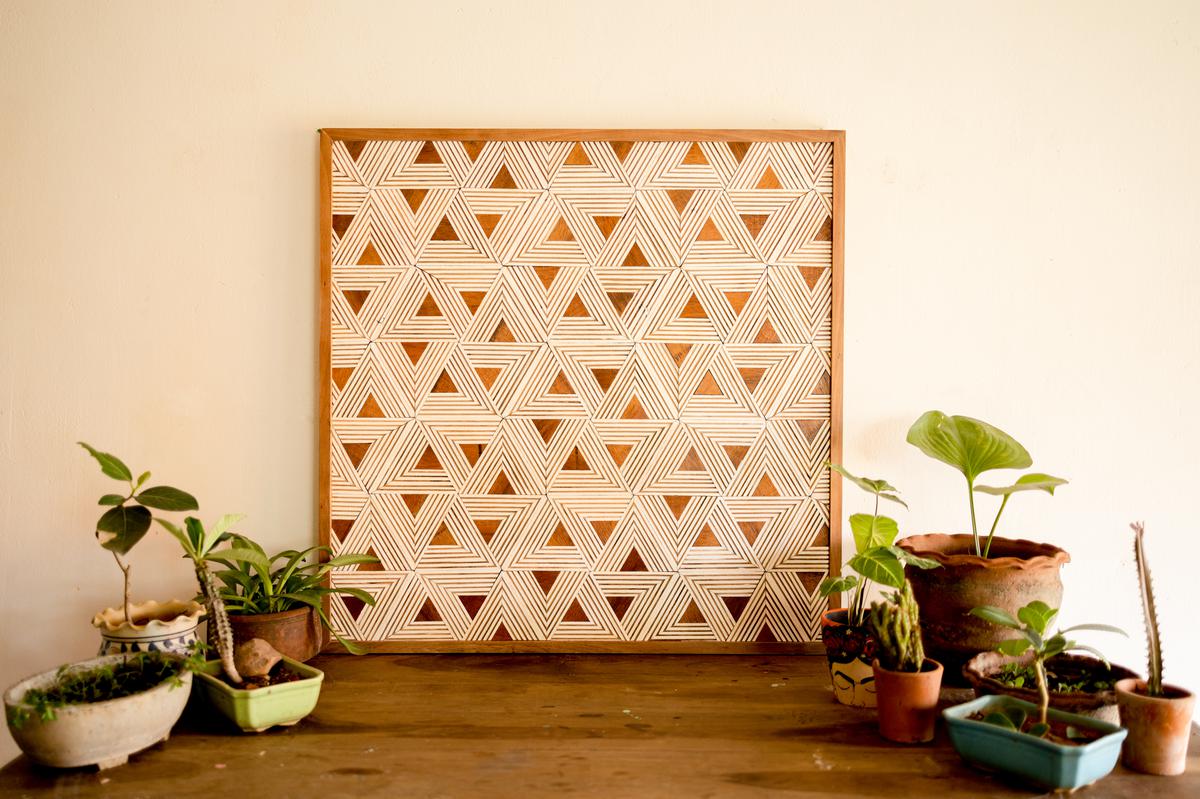Anish and Shailna | photo credit: special arrangement
When urban planners (policy and planning sector) Anish Cherian and Shailna Wadhwa started making indoor furniture for their cats, little did they think they were creating an alternative career for themselves. in 2018 Their pet furniture caught the attention of other cat owners and soon they were using their weekends to plan customized furniture layouts. As students of architecture, designing and execution was no problem. The Delhi-based duo decided to familiarize themselves with the tools and the actual work of bringing an idea to life.
Wooden Wall Hanging by Studio Clutter | photo credit: special arrangement
Fast forward to 2023: Shailna and Anish are no longer urban planners; He has shifted to Chennai and travels between Chennai, Hyderabad and Goa to conduct workshops on furniture manufacturing.
Shailna is quick to say, “Not just making furniture; We also teach various aspects of working with wood; bending and carving. When we started, we were customizing pet furniture. The pandemic gave us time off from regular work and we practiced and worked with wood. In 2021, we decided to quit our jobs and start Studio Clutter.
Shailna says they chose the name Studio Clutter because they make art out of wood too. Aneesh explains, “For some, waste wood is clutter but we see beauty and character in it. At the same time, we refuse to stick to the same style of work. As artists, we do not believe that one has There has to be a consistent aesthetic, color palette, medium and skill. We experiment a lot and have taught ourselves furniture making, wood carving, whistling, wood inlay and scroll sawing.”

A wooden art piece by Studio Clutter | photo credit: special arrangement
five years old Studio Clutter has also been teaching for the past three years. Anish says, “From 2019 to 2021 we were working on pet furniture, learning from our mistakes and improving ourselves before starting to teach.”
Shailna says, “We do not shy away from admitting that our first few pieces were broken. We learned from experience. Thanks to our architecture school background, we have developed a mastery of working with tools and mediums. That’s how we progressed very quickly.”
It took the pair about 15 projects to fully customize the cat houses. “It’s not so much about the design as working with the space, the different materials and the cats’ activity levels,” explained Aneesh
“It’s a vast subject and it’s still a learning process for us. We’ve learned a part of working with wood, but not everything. We do very simple designs. In layman’s terms what we It’s like taking initiation in carpentry. I still don’t know how to turn wood. We know how to work with teak and acacia but give us a new wood and we need time to learn its character and behavior Anish explains.
That’s why they explain that making furniture doesn’t just mean sawing, nailing and screwing. Getting the basics right is important; It starts with the correct measurement “for which the angle of the marker and the way it is marked make a difference. In our classes for adults, we discourage the purchase of any expensive equipment. Our classes focus on how to chisel, measure rather than just saw and hammer nails. Workshops for adults focus on interlocking wooden joints,” explains Aneesh.
Shailna is happy, “New age parents are not fussy. They know that children will be using different tools at work and will not feel the urge to move around. Kids love the drilling machine. We take no more than five students per workshop to ensure that we can provide individual attention. Kids are guided through the process of measuring, cutting, and assembling the wooden pieces. When handling machinery, it’s a hand-holding session. We also don’t use very powerful equipment and make sure protective gear like goggles, gloves and masks are on. The duration of the workshop depends on what we are teaching. At the end of the workshop, students take their work with them. At least two days are needed. We work mostly with German fir wood for the ease of handling the wood with the students. ,
When the two are not conducting workshops, they are creating art objects for gifting, taking customized orders etc. Soon, the studio will work on creating a Clutter collection.
Studio Clutter conducts a workshop for 18 years and above on 5th and 6th April, 8th and 9th in Hyderabad. The workshop fee is ₹7500. Chennai Workshop Details: 13th & 14th April, Course fee for 18 years and above is ₹7500.
For more information on her workshops visit www.studioclutter.com